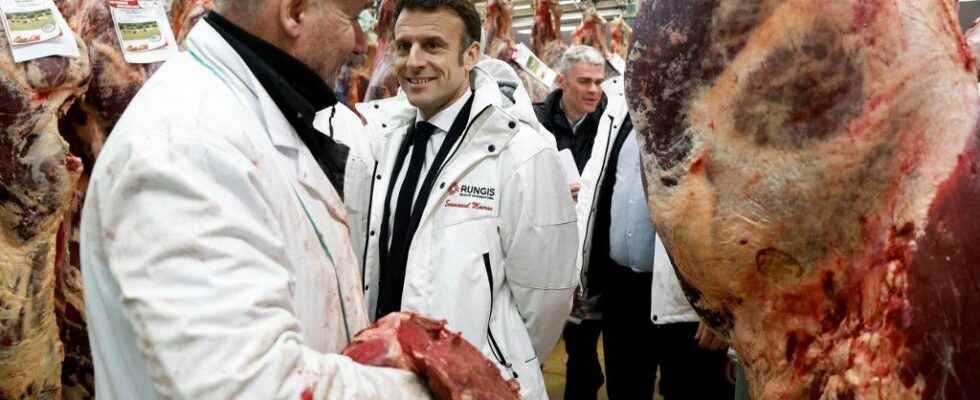He wanted to go “to the side of the French who work early”. Emmanuel Macron arrived around 5:30 a.m. on Tuesday February 21 at the largest fresh produce market in the world, at Rungis. It is his first outing in direct contact with the French since the launch at the beginning of the year of his highly contested pension reform, carried out in an electrifying political and social context. He was accompanied by the Minister of Agriculture Marc Fesneau and the Minister for SMEs Olivia Grégoire.
France that gets up early
Since the launch of the reform, Emmanuel Macron has hardly exposed himself, apart from a few trips abroad, during which he delivered sober and laconic messages on this reform, or very structured meetings. This trip to the south of Paris, with “professionals who work from dawn” is also an opportunity to put the “work” value at the center of its communication, described as a common thread of its action.
The nod is clear to “France that gets up early”, Nicolas Sarkozy’s leitmotif during his victorious presidential campaign in 2007, also taken up since by the far right. The presidential camp had recently seized it through the voice of the Minister of the Interior Gérald Darmanin to justify the effort required of the French to balance the pension system. “Yes, you have to get up early to go to work,” he said at the end of January.
Emmanuel Macron defends his reform
During his visit, the president for his part relied on the “common sense” of the French and reiterated that “we have to work a little longer”. “On the whole, people know that we all have to work a little longer on average, because otherwise we won’t be able to finance our pensions well,” said the head of state. After visiting veal cutting professionals, he defended a pension reform that “allows us to create more wealth for the country”.
“We cannot continue to say we have a crisis at National Education, we have a crisis at the hospital, how do we finance?”, he assured at the start of this visit at dawn where he wished transmit “a message of recognition in front of all those who allow our country to turn, to live”. “If we do not produce wealth, we cannot distribute it,” he recalled, convinced “that work must continue to pay more.”
In search of a way out of the tensions around pensions, the executive is also sketching out a future debate on the relationship to work. “Beyond the question of the length of professional life, we must improve the quality of life at work and find the conditions for good employment”, Prime Minister Élisabeth Borne argued on Monday, February 20. Emmanuel Macron also pleaded for “a real debate in our society on work”, while recognizing “a difficult context of inflation”, the “peak” of which will, according to him, be reached “this semester”.
